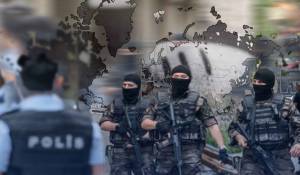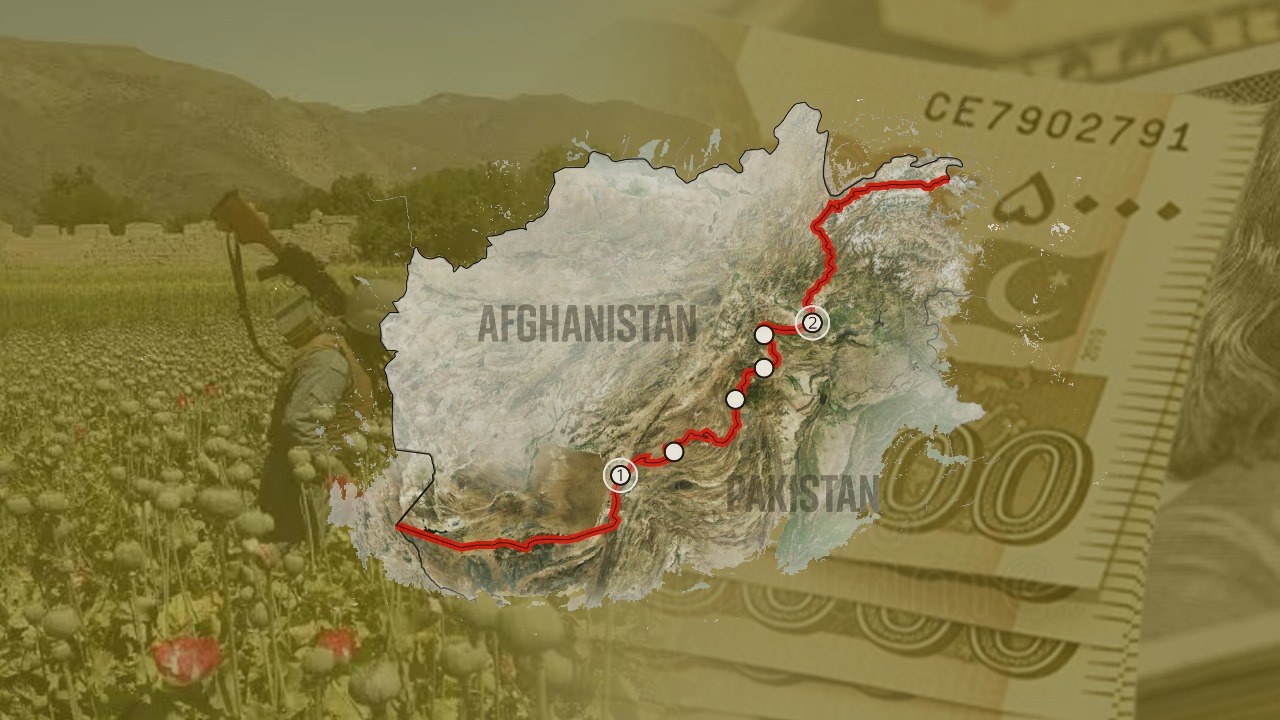The prolonged and protracted wars and conflicts spanning almost four decades in Afghanistan have resulted in neighboring Khyber Pakhtunkhwa (KP) becoming plagued with informal economy. This shift is primarily attributed to the persistent challenges posed by cross-border smuggling and illicit trade flows.
These wars have drastically affected the formal economic institutions in Afghanistan, contributing to the criminalization of the economy. Subsequently, the repercussions of this transformation were strongly felt in the eastern region of Afghanistan, bordering Pakistan’s Khyber Pakhtunkhwa province.
This significant amount was also highlighted in a letter written by KP’s former Inspector General of Police Nasir Khan Durrani the Chairman Federal Board of Revenues (FBR), Nasir Muhammad Khan, in 2016 , in which he expressed his concerns regarding the volumes of items smuggled into the province. According to him, the Karkhano Market “located on the boundary between Khyber Agency and Peshawar has become the most lucrative source of smuggling of various goods to different parts of the country.”
This article utilizes the official data provided by the Anti-Smuggler Division in Peshawar regarding the bordering territories. An estimation was derived from this data to assess the average percentage of commodities that traverse the bordering areas without obstruction, thus increasing the pie of the informal economy of KP.
According to the statistics the Pakistan Customs official shared with the scribe, customs officers in the bordering areas seized cars worth Rs1352 million from 2018 to 2023.
Major chunk includes cars that fall under section sector 157 of Custom Act 1969, include those caught while smuggling light goods such as clothes,. These vehicles are released after a particular time upon the collection of fines, while cars caught under Under Section 16 are not returned and remain in Customs custody.
Moreover, based on estimations of Anti-Smuggler Division in Peshawar, the quantity of narcotics being smuggled across borders and subsequently seized amounts to around 484 million. The substances under consideration encompass heroin, chars, ice and hashish.
As for arms and ammunition till year 2022, around Rs.145 million are confiscated by customs officials according to the statistics of Pakistan Customs This enormous flow of arms and weapons to the KP region, unhindered since these arms and weapons are sold out at much lower rates than their actual market value, has resulted in every household amassing heavy weapons. Consequently, it has promoted the “Kalashnikov culture” throughout Pakistan, particularly in KP and Balochistan.
The other primary concern for the officials is the smuggling of currency through the bordering areas. According to the estimates of Pakistan Customs, for the last five years, a significant amount of currency has been smuggled between the two countries. According to the data, around Rs930.45962 million have been caught by customs officials during smuggled attempts
While the official website of the Federal Board of Revenue (FBR) has rebutted the claim of cross-border smuggling in Pakistan as “unfounded, malicious in intent, and misleading in content [as] propaganda”, its existence was also highlighted in an investigate report on February 7, 2023 published by American company Bloomberg. According to the report, approximately $5 Million are smuggled across the Pakistan-Afghanistan border each day.
Speaking to the scribe on the condition of anonymity, a Customs official said that “there are loopholes in the border; and while the major routes are secured, the pedestrian points are used [for illicit flows of goods].”
He further added that since these points are not “highlighted nor organized, there are more possibilities of these points being used by people.”
When the customs official was asked about the small entry points along the border that used by the smugglers use to facilitate the outflow the currency, he acknowledged its possibility, saying, “they [the small points] are not neither much highlighted nor organized like the main borders,” thus resulting in smugglers making the most out of these entry points.
Exploring the players and government response towards it:
Despite the pledges of various regimes and the enhancement of the powers of law enforcement agencies (LEAs), the amount of goods smuggled through these borders has been unprecedented as the involvement of officials is still rampant.
Recently On October 2, 2023, Pakistan’s caretaker interior minister, Sarfaraz Bugti, accepted during a news conference security that personnel were actively involved in “large scale smuggling of oil, currency, and other commodities” to and from Pakistan to its neighboring countries.
Whereas, in 2016, the then army chief, General Raheel Sharif “dismissed six senior officials, including a three star and two star general” on account of alleged involvement in smuggling and other corrupt activities, according to The NewYork Times Newspaper published on 21 April 2016
However, the recent strict action of the government against illegal currency hoarders has resulted in a surge in currency confiscation.
While talking to a press conference on 11 September 2023, the Director of Pakistan’s anti-crime watchdog, the Federal Investigation Agency (FIA), Nisar Ahmad Khan Tanoli, said a crackdown was initiated against individuals involved in currency smuggling. He estimated that around Rs679 million worth of currency was confiscated during various crackdowns.
In addition, the recent data presented to the Apex Committee of the KP government on the recent crackdowns against smuggling and illicit flows shows a similar situation. According to it, around 440 raids have been conducted, during which Rs3349 million worth of currency had been seized from various shops and plazas.
When it comes to smuggling through the Torkham Border, customs officials said they have confiscated approximately Rs0.462 million Saudi riyal, US$ 3650, and AED 13, 400.
Meanwhile, around US$18,000 have been seized by the Pakistan Customs at the Ghulam Khan border
Establishment of Dara and Bara Markets:
These unabated flows of goods resulted in the establishment of Bara Markets. These markets are situated 14 kilometers away from the Peshawar’s Saddar area in the Tehsil Bara, Khyber District.
Bara markets have been famous for the cheap goods on which taxes and customs duties are not paid.. From household goods to arms and ammunition and everything in between, these markets had a lot of things to offer. . Therefore, the regular flow of goods and low smuggling costs made these markets a business center for informal economy.
The customs official,quoted above, however, denied witnessing an increase in the number of bara markets in Pakistan. He said, “If previously 100 items were being smuggled, now they have been reduced to 10–15 items”.
On the other hand, when a local customer, who also turned out to be a drug addict, was asked about the source of his drug supplies, he replied, “These drugs are available at the Karkhano market at a mass level. There are dealers that can bring you any kind of drugs you like”.
He added that most of these dealers were “Afghans who smuggle these drugs with them, which are then sold at lower costs than in other cities of Pakistan.”
Underlying reasons behind the prevalence of illicit trade:
This increase in terms of illicit flows has been due to severe structural and governance issues.
Based on a study, “The Causes of Transit Related Pak-Afghan Cross Border Smuggling”,written by Syyed Waqar Hussai, Asmat Ullah, and Bashir Ahmad Khilji, published January 2014, the rise of the Taliban in 1997 led to a sustained rise in illicit trade, due to “improved security conditions.” Consequently, safer routes facilitated the significant expansion of illegal trade operations.
This is also stated in the report of United Nations Security Council Resolution on Afghanistan published on 1st June 2022, according to which the arrival of the Taliban “dismantled the network of roadside checkpoints” in order to “regulate and centralize” cross-border revenue collection. As according to the report, the illicit flows “continue as significant sources of illicit revenue for the Taliban.”
Previously, in 1965, the Afghanistan and Pakistan Transit Trade Agreement (ATT) was signed between the two countries. The rationale behind the signing of this agreement was to foster and facilitate trade between both countries and let goods flow through the borders, unhindered.
According to the customs official, “this agreement resulted in the issue of dropping cases. According to him, “the goods that were imported from any country used to end up in Pakistan, without reaching their desired location”. Hence, through this, a wide proportion of the goods usually ended up inside Pakistan's territory without paying any duties on the goods, thus making the country home to the “biggest smuggling racket of the world.”
According to estimates published in Dawn newspaper on October 8, 2023, , due to transit trade, the volume of smuggling had reached “63 percent, soaring from $2.287bn to $3.731bn.”
Furthermore, this immense increase in terms of illicit flows has also been the result of many other factors, such as the uncertainty in the justice system, unemployment and soaring joblessness among people, particularly among the youth, bureaucratic and red tape culture, no inclusive mechanism for women and children, hefty taxes imposed on traders, strict legal process for business registration, overregulation of the general economy, high taxes, and the costs of formalizing transactions, among others.
Way forward?
As long as the flows of informal economy remain underreported and no strict measures and reforms are taken or implemented, the country’s growth in terms of the GDP cannot be reflected in the elevation of poverty and employment.
Dr Abdul Wahid, Assistant Professor of Management Sciences at NUML University, explained that to stop the menace of smuggling and illicit flows, the “government shall use a policy of carrot and stick in which they should give the incentives to the traders and locals by reducing the taxes”. This, he said, will turn informal trade into a channelized and formal process.
Apart from that, it is incumbent upon the government “to foster and strengthen the capacity of the law enforcement institutions on the bordering areas”. This strengthening of institutions will reduce the gap that is prevalent between the civilians and the governments by acting as a channel to invest.
Lastly, the rampant smuggling of goods has also been the result of exchange rates on both side of the borders. Smuggling primarily depends upon the exchange rate. If the rates are good in Pakistan, goods will ultimately end up being dropped on this side of the border and vice versa. Therefore, the government needs to balance the exchange rate and only then can the smuggling of goods be curtailed.
Disclaimer: Views expressed by the writer in this blog are his own and do not necessarily reflect The Khorasan Diary's policy.


